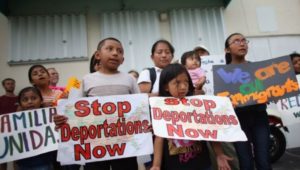By Riley Brook || Contributing Writer

I remember the first time I saw Anna’s mom. She stood nervously in the corner of the gym where high school girls and their parents gathered for the official introduction to the high school girl’s soccer meeting. After the meeting I walked up to introduce myself. As an upperclassman, I had always tried to introduce myself to the parents of the new soccer players.
“Hi, my name is Riley. I’m a senior and I’m really excited to play with Anna.”
She hesitated before trying some broken English mixed in with a few Spanish words I recognized, before waving her hand in front of her face as if to apologize for not being able to respond. Feeling a bit insecure about my own Spanish, I gave the most polite smile I could before nodding and walking away.
A month later, Anna and I were on the soccer field making small talk when I asked her about her family. My question made her uncomfortable and I immediately felt badly for asking. In time, and through a growing friendship, I learned that she lived off Federal Boulevard, an area in Denver well known as low income and high in crime. Anna’s dad worked for an auto company while her mom did jobs “here and there” in between caring for her three siblings. She eventually shared that both her parents were undocumented. She explained that although her parents had been trying for years to become legal United States citizens, they had not been able to fill out all the documents. They were waiting for Anna to turn eighteen so she could help them with the paperwork. At age fifteen, Anna was experiencing a reality that was completely foreign to me. She was scared her parents would be deported. She was scared she would be left alone to care for her siblings, or be forced out of the only country she had ever known. All of these fears, shared on the soccer field of a prep school in Denver, where most of us were concerned only with beating our rival school.
My world has been one surrounded by wealth and entitlement. I have studied in class and read snippets about the immigration crisis, the quest to build a wall, and the fear that illegal immigrants are depleting our resources and increasing our crime, but I could feel none of these things. That is, until I met Anna and compared her reality to my own.
Now the Deferred Action for Childhood Arrivals (DACA) is in the headlines. DACA allows children of undocumented immigrants to live, study, and work legally in the United States, without fear of deportation. Today there are 800,000 people enrolled in the DACA program, some of which are our classmates here at Franklin and Marshall. With President Trump’s rescission of DACA, the program is now in jeopardy and Congress has six months to figure out a solution.
I have heard the arguments supporting the rescission of DACA. Those who break the law by coming here illegally should not be benefitted by giving their children a free pass to citizenship as it will only encourage further illegal immigration, so the argument goes. I don’t buy it. It seems too simplistic an argument which ignores the complexity and the reality of the situation. Anna’s reality. Rescission of DACA feels more like a betrayal of the foundation on which our country was built: hope, opportunity, empathy, freedom, and respect. There has to be a better way. I’m going to fight for Anna.
First-year Riley Brook is a contributing writer. Her email is rbrook@fandm.edu.